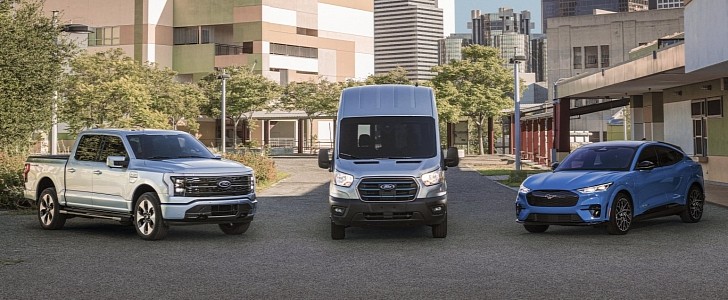Ford was among the carmakers most affected by their dealers’ shoddy practices, with markups and reselling putting a dark mark on the carmaker’s reputation. Despite repeated attempts to curb the trend, nothing really helped. Ford wants to impose strict rules that dealers must adhere to if they want to sell Ford EVs.
Ford certainly sent shock waves across the automotive industry when it announced new certification rules during the annual dealership meeting in Las Vegas. What happens in Vegas stays in Vegas, they say, but not this time. Among the harshest rules imposed on dealers is a new no-haggle policy and the requirement to invest as much as $1.2 million in DC fast chargers if they want to keep selling electric vehicles.
Ford promotes a new sales model to better compete with direct-sales startups like Tesla and uses the excuse of a new brand image and sales standard to tighten the screw on the dealerships. Dealers have until October 31 to opt into one of two EV certification tiers, Model e Certified Elite or Model e Certified, or be cut entirely from the EV allocation. Each tier comes with necessary investments, most of them for installing DC fast charging stations.
The Model e Certified Elite dealers will need to invest $900,000 initially, primarily toward installing two DC fast-charging stations, of which one must be available to the public. By 2026, they will need to cough up $300,000 more for a third fast charging station. Certified Elite dealers will have perks like vehicles in stock and demo cars and receive the most car allocations.
Ford offered the Model e Certified tier for smaller dealers who could not afford the bigger investment. This carries a $500,000 investment, with the bulk of the money going toward installing a single public-facing fast charging station. With smaller investment comes smaller EV allocations (although Ford hasn’t decided on the cap yet), no vehicle stock, and no demo units.
Each certification will be effective from January 1, 2024, until the end of 2026, but the dealers need to opt in now. For those who pass the offer, the nearest opportunity to opt in will come in 2025. Provided they fulfill the requirements, they will be allowed to start selling EVs in January 2027.
And it’s not just the investments that will cut deep into dealers’ bottom line. Ford wants them to forgo much of their fees to level the field with direct-sale carmakers like Tesla. According to Jim Farley, cited by Automotive News, the current retail model creates a roughly $2,000 disadvantage against direct-sale rivals, which needs to go to get Ford out of “the red zone.”
The most significant change is the no-haggle price policy, though. Ford dealers must set a fixed price online on Ford’s webpage, although the price can be different from dealer to dealer. But the potential buyers can compare the prices online and buy from whatever dealer offers the best conditions. The vehicles are still delivered to the dealership, but the new sales model will ensure a more transparent buying process.
Ford promotes a new sales model to better compete with direct-sales startups like Tesla and uses the excuse of a new brand image and sales standard to tighten the screw on the dealerships. Dealers have until October 31 to opt into one of two EV certification tiers, Model e Certified Elite or Model e Certified, or be cut entirely from the EV allocation. Each tier comes with necessary investments, most of them for installing DC fast charging stations.
The Model e Certified Elite dealers will need to invest $900,000 initially, primarily toward installing two DC fast-charging stations, of which one must be available to the public. By 2026, they will need to cough up $300,000 more for a third fast charging station. Certified Elite dealers will have perks like vehicles in stock and demo cars and receive the most car allocations.
Ford offered the Model e Certified tier for smaller dealers who could not afford the bigger investment. This carries a $500,000 investment, with the bulk of the money going toward installing a single public-facing fast charging station. With smaller investment comes smaller EV allocations (although Ford hasn’t decided on the cap yet), no vehicle stock, and no demo units.
Each certification will be effective from January 1, 2024, until the end of 2026, but the dealers need to opt in now. For those who pass the offer, the nearest opportunity to opt in will come in 2025. Provided they fulfill the requirements, they will be allowed to start selling EVs in January 2027.
And it’s not just the investments that will cut deep into dealers’ bottom line. Ford wants them to forgo much of their fees to level the field with direct-sale carmakers like Tesla. According to Jim Farley, cited by Automotive News, the current retail model creates a roughly $2,000 disadvantage against direct-sale rivals, which needs to go to get Ford out of “the red zone.”
The most significant change is the no-haggle price policy, though. Ford dealers must set a fixed price online on Ford’s webpage, although the price can be different from dealer to dealer. But the potential buyers can compare the prices online and buy from whatever dealer offers the best conditions. The vehicles are still delivered to the dealership, but the new sales model will ensure a more transparent buying process.







